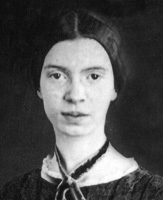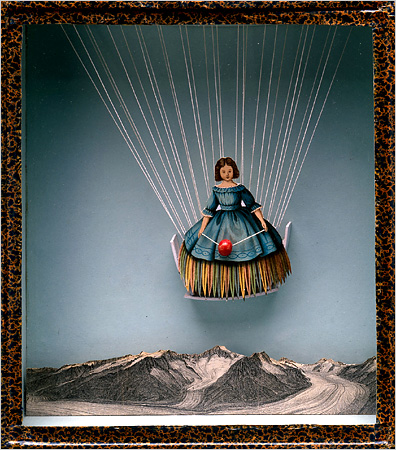
Emily Dickinson |
A Celebration of the Life & Work of Emily Dickinson
Soul at the White Heat Reading of poems & letters
Dinkelspiel Auditorium, Stanford University
By Peter Y. Chou |

Joseph Cornell (1903-1972) |
| Preface: On January 25, I received an email from Stanford Continuing Studies announcing three free events celebrating the life and work of Emily Dickinson. The picturesque flyer had a quote from Emily: "Truth is such a rare thing it is delightful to tell it." Before I could share this info with friends, I received an email from my friend Peter Robinson on January 28. He told me about this Emily Dicksinson Event along with a poem with fresh insight on poetry. I was inspired to write a response poem and six haikus for January 28. I also found some postage stamps to illustrate his poem and mine for a web page celebrating Emily Dickinson's poetry. I arrived at Dinkelspiel Auditorium around 6:40 pm and there were already over 100 in the audience. I found an aisle seat four rows from the stage in the central section. The 6-page program brochure was informative with Director's Notes by Amy Freed, 8 short biographies of the performers, and a list of 33 Emily Dickinson poems with Poem #s from Thomas Johnson's The Complete Works of Emily Dickinson (1960). A handout on Emily Dickinson from the Academy of American Poets with her photo, biography, and selected bibliography was delightful reading before the evening's performance. Professor Charles Junkerman introduced the event saying that in 2001, Stanford honored Herman Melville's 150th anniversary of Moby Dick. In 2005, Stanford honored Walt Whitman's 150th anniversary of Leaves of Grass. Emily Dickinson's poems were published posthumously in 1890, but she created 40 fascicles from 1858-1865 containing nearly 800 poems, that was discovered after she died. So this could be the 150th anniversary of Emily's 1858 fascicles of poems. The evening's program was staged like a drama of Emily's poetic life beginning with Thomas Wentworth Higginson (acted brilliantly by Professor Hilton Obenzinger in 19th century attire and top hat) receiving a letter from Emily Dickinson written on April 16, 1862. Julie Eccles, Kay Kostopoulos, and JoAnne Winter played the three Emily's taking turns reading Emily's poems that gave us a glimpse of her life and mind. Here are my notes for the evening of the poems and letters read. The second half of the program was a panel discussion with Albert Gelpi, Hilton Obenzinger, and Amy Freed, followed by a Q & A session. The program ended at 9:20 pm with huge applause from the audience. I've typed the 33+ poems read at the celebration below. Commentaries from Joseph Duchac's The Poems of Emily Dickinson: an annotated guide to commentary published in english, 1890-1977 (1979) have been added to elucidate these poems. |
| Poems Read at Celebration | Joseph Duchac, Poems of Emily Dickinson Guide to Commentary 1890-1977) (1979) |
|
(1) Poem 320
We play at Paste— | 1951 Patterson, Riddle, pp. 77, 259 "Paste" describes Dickinson's early friends; her friend Kate Scott is the pearl. 1968 Sherwood, Circumference, p. 177 "The word tactics... reflects Emily's belief that the Creator does not endow His creature with immortality but 'qualifies' him to achieve it." 1972 Talbot, Child, Actress, p. 107 The poem is about "being ready and eager to write great poetry, and finding with relief that the minor earlier work is the same in tactics if not in material." |
|
(2) Poem 216
Safe in their alabaster chambers, |
1965 Alexander, Poetry of ED, pp. 82-83, 85, 103, 104 The poet appears to say that "people who are blinded by a narrow religion suffer twice": they will not let themselves experience the earth while they are alive, and when they are dead, it is too late. 1967 Pickard, Emily Dickinson, pp. 2, 44, 119-21, 124 The poem "examine vaious attitudes on death and immortality"; it "moves from the linear, closed images of the tomb into circular, expanding ones of crescents, scoops, and arcs, away from temporal limitations to the grandeur of years and worlds and finally into the firmament itself. 1975 Mudge, Home, pp. 101, 213-214 "It is not so much that this poem expresses Dickinson's cynicism about the resurrection hope that that in the length of time and the order of nature the dead are forgotten on this earth, in this world." 1975 Weisbugh, ED's Poetry, pp. 109-13, 191 The poem is "a terrifying vision of the grave as a possibily permanent hell." Compares versions. "The revised poem is designed to make both life and death condemn themselves and each other." |
|
(3) Poem 318
The nearest dream recedes, unrealized. |
|
|
(4) Poem 670
One need not be a Chamber— to be Haunted— |
|
|
(5) Poem 371
A precious— mouldering pleasure— 'tis— |
|
|
(6) Poem 1400
What mystery pervades a well! |
|
|
(7) Poem 328
A bird came down the walk: |
|
|
(12) Poem 448
This was a Poet— It is That |
|
|
(29) Poem 465
I heard a Fly buzz— when I died— |
|
|
(31) Poem 712
Because I could not stop for Death— |
|
One of the most powerful definitions of poetry and my favorite may be found in Emily Dickinson's August 16, 1870 remark to Thomas Wentworth Higginson (1823-1911) on his first visit to her in Amherst, Massachusetts. It was published in The Atlantic (October 1891), twenty-one years after his interview with Emily and five years after her death. Higginson precedes her quote with "this crowning extravaganza":
“If I read a book and it makes my whole body so cold no fire
can ever warm me, I know that is poetry. If I feel physically
as if the top of my head were taken off, I know that is poetry.
These are the only ways I know it. Is there any other way?”
— The Letters of Emily Dickinson (Edited by Thomas H. Johnson)
Belknap Press of Harvard University Press, Cambridge, MA, 1958
(PS1541,Z5.A3.V2), Volume 2, pp. 472-474, Letter 342a
*************************************************************************************
![]()
| Top of Page
| Emily Celebration
| Emily Event 2
| Emily Event 3 |
| Emily's Definition
| Emily Poems
| Peace Poems
| Gratitude Poems |
| Emily's Letters
| Emily's Poetry
| Emily at Bartleby |
| Poems Index
| Art & Spirit
| Books
| Enlightenment
| Poetry
| Home |
![]()
| © Peter Y. Chou, WisdomPortal.com P.O. Box 390707, Mountain View, CA 94039 email:  (1-31-2008) (1-31-2008) |
 |